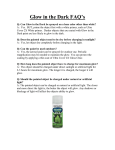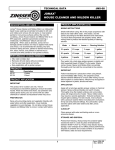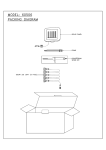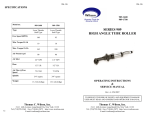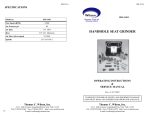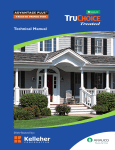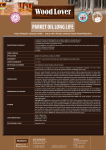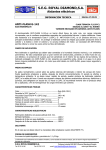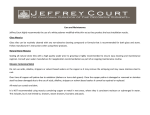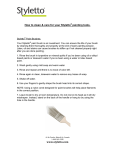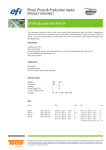Transcript
Finishes No other wood takes and holds finishes better than redwood. California redwood’s performance and finish-holding ability make it one of nature’s most maintenance-free building materials. Description Application Maintenance Clear Water Repellents with Mildewcide: Clear finishes that modify weathering characteristics and let color and grain show through. Apply with brush or roller. Use one or two coats according to the manufacturer’s directions. For best results, coat sawn ends, backs and edges before nailing in place. Reapplication may be required after old finish has lost its effectiveness. In humid or harsher climates, reapplication may be required every 12-18 months. Before applying, wood may be restored to its natural color with trisodium phosphate and oxalic acid treatment. Bleaching or Weathering Stains: Low maintenance, natural appearance with a gray-toned finish. Apply with brush or roller. Use one or two coats according to manufacturer’s directions. Bleaching is aided by sunlight and moisture, so it may speed the process to periodically dampen surfaces with a fine spray from a garden hose. Bleaching oils and stains provide nearly maintenance-free performance. Reapply finish only if wood begins to darken or bleaching is uneven. One refinish coat should be enough. Semitransparent Stains: Penetrating finishes available in a variety of semitransparent colors including several redwood hues. Oil-based stains are recommended. Apply with brush for best results, next best is a roller. Avoid drips and lap marks. Two coats usually required for new wood— follow manufacturer’s directions. Refinishing may be necessary every 3 to 5 years. Color in pigmented stains may wear away gradually after weathering. Light brushing with a bristle brush will help remove old finish in some spots. One refinish coat is usually enough. Solid Body Stains: Film forming finishes available in a wide variety of colors. Oilbased stains are recommended. For best results use a brush. The next best applicator is a roller. Avoid drips and lap marks. Two coats usually required for new wood—follow manufacturer’s directions. Refinishing may be necessary every 3 to 5 years. Color in pigmented stains may wear away gradually after weathering. Light brushing with a bristle brush will help remove old finish in some spots. One refinish coat is usually enough. Apply with brush for best results, roller is next best applicator. One prime coat and two top coats are recommended for new wood. Back-priming is highly recommended. Use oil- or alkyd-based stain-blocking primer. Acrylic latex top coat is recommended. Refinishing may be necessary every 7 to 10 years. Paint films that are too thick tend to peel and crack. Sand or scrub with stiff bristle brush. Paint and varnish removers may also be used. If sanding, countersink galvanized nail heads to protect their coating. Natural appearance finishes Pigmented Stains Paints Paints: Durable, attractive finishes for traditional exteriors. Quality paints are generally worth the extra cost. Finishes not recommended: varnishes and clear film finishes, oil treatments, “shake and shingle” type paints. 16
